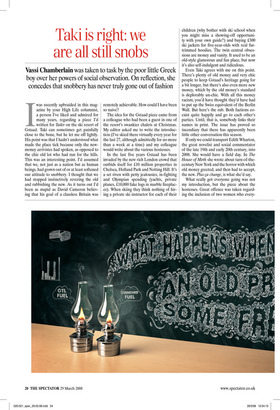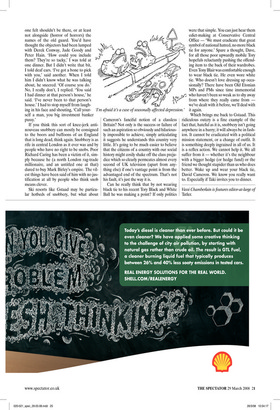Taki is right: we are all still snobs
Vassi Chamberlain was taken to task by the poor little Greek boy over her powers of social observation. On reflection, she concedes that snobbery has never truly gone out of fashion Iwas recently upbraided in this magazine by your High Life columnist, a person I’ve liked and admired for many years, regarding a piece I’d written for Tatler on the ski resort of Gstaad. Taki can sometimes get painfully close to the bone, but he let me off lightly. His point was that I hadn’t understood what made the place tick because only the newmoney arrivistes had spoken, as opposed to the chic old lot who had run for the hills. This was an interesting point. I’d assumed that we, not just as a nation but as human beings, had grown out of or at least softened our attitude to snobbery. I thought that we had stopped instinctively revering the old and rubbishing the new. As it turns out I’d been as stupid as David Cameron believing that his goal of a classless Britain was remotely achievable. How could I have been so naive?
The idea for the Gstaad piece came from a colleague who had been a guest in one of the resort’s swankier chalets at Christmas. My editor asked me to write the introduction (I’ve skied there virtually every year for the last 27, although admittedly for no more than a week at a time) and my colleague would write about the various hostesses.
In the last five years Gstaad has been invaded by the new rich London crowd that outbids itself for £10 million properties in Chelsea, Holland Park and Notting Hill. It’s a set riven with petty jealousies, in-fighting and Olympian spending (yachts, private planes, £10,000 fake logs in marble fireplaces). When skiing they think nothing of hiring a private ski instructor for each of their children (why bother with ski school when you might miss a showing-off opportunity with your own guide?) and buying £300 ski jackets for five-year-olds with real furtrimmed hoodies. The twin central obsessions are money and vanity. It used to be an old-style glamorous and fun place, but now it’s also self-indulgent and ridiculous.
Even Taki agrees with me on this point. There’s plenty of old money and very chic people to keep Gstaad’s heritage going for a bit longer, but there’s also even more new money, which by the old money’s standard is deplorably un-chic. With all this money racism, you’d have thought they’d have had to put up the Swiss equivalent of the Berlin Wall. But here’s the rub. Both factions coexist quite happily and go to each other’s parties. Until, that is, somebody links their names in print. The issue has proved so incendiary that there has apparently been little other conversation this season.
If only we could transport Edith Wharton, the great novelist and social commentator of the late 19th and early 20th century, into 2008. She would have a field day. In The House of Mirth she wrote about turn-of-thecentury New York and the horror with which old money greeted, and then had to accept, the new. Plus Va change, is what she’d say.
What really got everyone going was not my introduction, but the piece about the hostesses. Great offence was taken regarding the inclusion of two women who every one felt shouldn’t be there, or at least not alongside (horror of horrors) the names of the old guard. You’d have thought the objectors had been lumped with Derek Conway, Jade Goody and Peter Hain. ‘How could you include them? They’re so tacky,’ I was told at one dinner. But I didn’t write that bit, I told deaf ears. ‘I’ve got a bone to pick with you,’ said another. When I told him I didn’t know what he was talking about, he sneered. ‘Of course you do.’ No, I really don’t, I replied. ‘You said I had dinner at that person’s house,’ he said. ‘I’ve never been to that person’s house.’ I had to stop myself from laughing in his face and shouting, ‘Call yourself a man, you big investment banker pussy.’ If you think this sort of knee-jerk antinouveau snobbery can mostly be consigned to the boors and buffoons of an England that is long dead, think again. Snobbery is as rife in central London as it ever was and by people who have no right to be snobs. Poor Richard Caring has been a victim of it, simply because he (a north London rag-trade millionaire, and an untitled one at that) dared to buy Mark Birley’s empire. The vilest things have been said of him with no justification at all by people who think snob means clever.
Ski resorts like Gstaad may be particular hotbeds of snobbery, but what about Cameron’s fanciful notion of a classless Britain? Not only is the success or failure of such an aspiration so obviously and hilariously impossible to achieve, simply articulating it suggests he understands this country very little. It’s going to be much easier to believe that the citizens of a country with our social history might cosily shake off the class prejudice which so clearly permeates almost every second of UK television (apart from anything else) if one’s vantage point is from the advantaged end of the spectrum. That’s not his fault, it’s just the way it is.
Can he really think that by not wearing black tie to his recent Tory Black and White Ball he was making a point? If only politics were that simple. You can just hear them edict-making at Conservative Central Office — ‘We must eradicate that great symbol of national hatred, no more black tie for anyone.’ Spare a thought, Dave, for all those poor upwardly mobile Tory hopefuls reluctantly pushing the offending item to the back of their wardrobes. Even Tony Blair was comfortable enough to wear black tie. He even wore white tie. Who doesn’t love dressing up occasionally? There have been Old Etonian MPs and PMs since time immemorial who haven’t been so weak as to shy away from where they really came from — we’ve dealt with it before, we’ll deal with it again.
Which brings me back to Gstaad. This ridiculous outcry is a fine example of the fact that, hateful as it is, snobbery isn’t going anywhere in a hurry; it will always be in fashion. It cannot be eradicated with a political mission statement, or a change of outfit. It is something deeply ingrained in all of us. It is a reflex action. We cannot help it. We all suffer from it — whether it’s the neighbour with a bigger hedge (or hedge fund) or the friend we thought stupider than us who does better. Wake up and wear your black tie, David Cameron. We know you really want to. Especially if Taki invites you to dinner.
Yassi Chamberlain is features editor-at-large of Tatler.

















































































 Previous page
Previous page